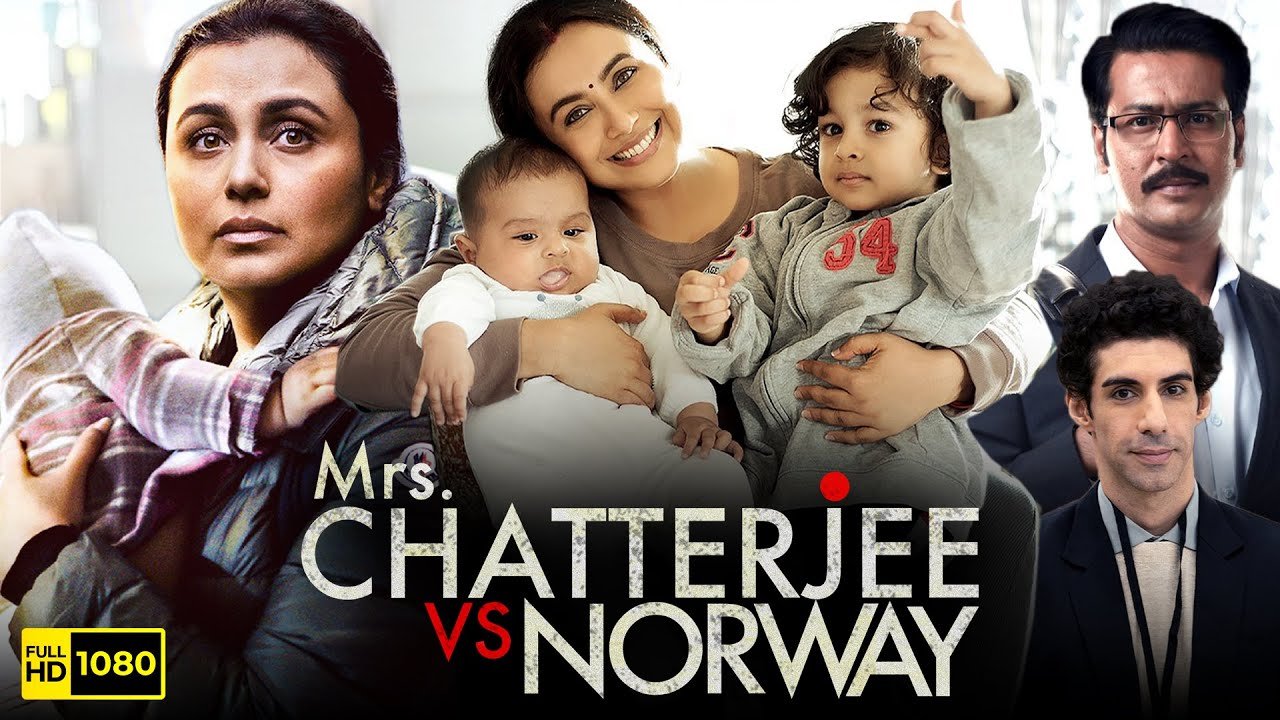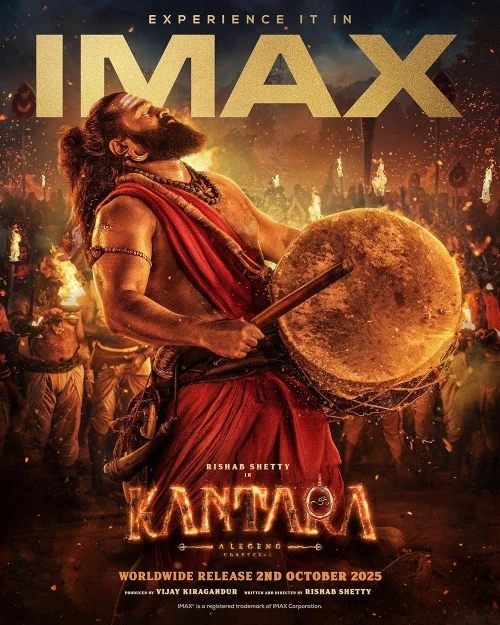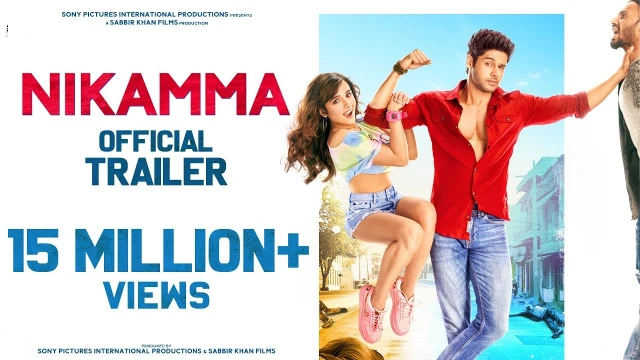Mrs Chatterjee vs Norway – A Mother’s Battle for Justice and Identity

🎬 Table of Contents
- Story and Plot Summary (Non-spoiler + Spoiler parts)
- Cast and Characters
- Music and Soundtrack (Composer, Songs, Lyrics, Reception)
- Performances and Acting Reviews
- Dialogues and Writing Style
- Release and Promotion Strategy
- Box Office and OTT Streaming Performance
- Critical and Public Reception
- Cultural Impact and Public Response
- Comparisons with Similar Movies
- Awards and Recognition
- Conclusion and Final Thoughts
1. Story and Plot Summary 📖
Non-Spoiler Summary
Mrs Chatterjee vs Norway is a deeply emotional and powerful drama inspired by real events. The film follows the heart-wrenching journey of a mother living in Norway, whose life is turned upside down when her two children are taken away by the Norwegian child welfare services. What follows is her relentless battle against an unfamiliar system in a foreign land to win back her children. It’s a story of love, motherhood, and fierce resilience.
Set against the backdrop of cultural misunderstandings and legal battles, the film captures how different societies perceive parenting. It also highlights the immigrant experience, the clash of values, and a mother’s refusal to back down in the face of overwhelming odds.
Spoiler Summary
Debika Chatterjee, an Indian mother settled in Norway with her husband, faces a nightmare when Norwegian authorities take away her children, citing issues in her parenting. What the authorities see as cultural malpractice, Debika sees as normal motherly care. Despite complying with official processes, she feels alienated, isolated, and helpless in a cold bureaucratic system.
Her husband’s unsupportive stance further isolates her. However, Debika refuses to give up. She appeals, fights through the legal system, reaches out to the Indian government, and eventually returns to India in a final desperate attempt to bring her children back. The film ends with a bittersweet victory — a testament to a mother’s unconditional love and her fight against systemic injustice.
2. Cast and Characters 🎭
The film features a small but impactful cast, each playing a critical role in bringing the emotional intensity of the story to life.
Rani Mukerji as Debika Chatterjee
At the center of the story is Rani Mukerji in a career-defining role. She plays Debika, the mother who refuses to surrender her children to the system. Her portrayal is raw, intense, and deeply human. Every emotion she displays—whether it’s love, anger, helplessness, or determination—feels authentic and relatable.
Anirban Bhattacharya as Aniruddha Chatterjee
Anirban plays Debika’s husband, a man caught between cultural expectations, ambition, and the pressure to assimilate into Norwegian society. His character is complex—often frustrating yet grounded in reality. His cold, calculated decisions act as a sharp contrast to Debika’s warmth and impulsiveness.
Jim Sarbh as Daniel Singh Ciupek
Jim Sarbh portrays a diplomat who becomes a crucial support system for Debika. Calm, composed, and deeply empathetic, he brings a balanced presence to a film driven by intense emotions. His scenes highlight how diplomatic channels can impact personal lives.
Balaji Gauri and Norwegian Cast
The Norwegian social workers and legal officials are played convincingly by a set of European actors who bring credibility to the courtroom and foster-care scenes. Their emotionally detached demeanor adds to the frustration and tension in the plot.
The small cast list works in favor of the film, keeping the narrative focused and emotionally sharp.
3. Music and Soundtrack 🎵 – Mrs Chatterjee vs Norway
The film’s music and background score play an essential role in enhancing its emotional tone. Composed by Amit Trivedi, the soundtrack doesn’t rely on commercial songs but rather subtle, mood-driven pieces that complement the narrative.
Background Score
The orchestral music is minimal yet haunting. Amit Trivedi blends Indian instruments with European-style arrangements, mirroring the cross-cultural conflict central to the film.
Key Songs
- Shubho Shubho – A heart-touching melody that captures Debika’s bond with her children.
- Aami Jaani Re – A soulful track expressing longing and hope, sung with depth and emotion.
- Maa Ke Dil Se – Used in a pivotal scene, this song underlines the depth of a mother’s love.
Lyrics and Reception
Penned by Kausar Munir, the lyrics are simple yet powerful. They reflect a mother’s pain and spiritual endurance. The songs didn’t top music charts but resonated deeply with the film’s audience.
Overall, the music doesn’t try to overpower the storytelling. Instead, it stays in the background—emotional, restrained, and respectful of the subject.
4. Performances and Acting Reviews 🌟
Rani Mukerji’s performance is the cornerstone of the film. She brings fierce vulnerability to Debika, never once letting the audience detach from her pain. Her body language, Bengali accent, and emotional breakdowns are portrayed with nuance and authenticity.
The courtroom sequences, in particular, are masterclasses in acting. Without becoming melodramatic, she manages to stir the soul. Critics and audiences alike hailed her performance as one of her finest, drawing comparisons to her iconic roles in Black and Mardaani.
Anirban Bhattacharya plays his role with controlled detachment, making his character both realistic and difficult to digest. His performance mirrors how societal pressure can distort moral compass, especially for immigrants in foreign nations.
Jim Sarbh’s performance is understated but effective. He adds calmness to an otherwise emotionally turbulent film. His controlled dialogue delivery makes every scene with him feel thoughtful.
The children, though not professionally trained actors, do a commendable job and never feel out of place. Their natural reactions and chemistry with Rani Mukerji make their scenes touching and credible.
5. Dialogues and Writing Style ✍️ – Mrs Chatterjee vs Norway
The film’s dialogues are powerful without being preachy. Written by Sameer Satija and Ashima Chibber, they blend legal jargon, cultural conflict, and raw emotion with finesse.
Memorable lines:
- “A mother doesn’t need a manual to raise her child.”
- “If love is a crime, then I plead guilty.”
- “Your laws may differ, but a mother’s heart is the same everywhere.”
The courtroom dialogues are especially impactful. They draw attention to cultural differences in parenting while maintaining a respectful tone. The film avoids painting any one culture as entirely right or wrong, instead showing how interpretation and empathy can bridge the gap.
The writing style is straightforward, emotionally driven, and avoids unnecessary complications. It uses plain language, making it accessible to a wide range of audiences. Flashbacks are used effectively, helping to build the emotional backstory without dragging the pace.
6. Release and Promotion Strategy 📢 – Mrs Chatterjee vs Norway

The film followed a carefully designed release and promotion strategy, relying more on emotional connection than typical Bollywood glam.
Trailer Release
The official trailer created strong buzz. It was emotional and intense, giving viewers a glimpse of the legal drama without revealing major spoilers. It trended widely across YouTube and social media, especially among parents and women’s groups.
City Screenings
Promotions were done through selective city screenings in India, including Delhi, Mumbai, and Kolkata. Rani Mukerji interacted directly with the media and NGOs working for women and child rights.
International Focus
Given the subject matter, the film also received attention abroad. Several screenings were held in the UK, Canada, and Norway. The film’s story sparked conversations among Indian diaspora communities.
Digital Outreach
Rani Mukerji did a few heartfelt interviews instead of mass marketing. Hashtags like #JusticeForDebika and #MaaKiLadai trended for several days around the release date.
The film’s marketing leaned more on realism and sentiment rather than star power. It worked well, as it set audience expectations correctly—this is not entertainment, but a wake-up call.
7. Box Office and OTT Streaming Performance 💸
Upon its release, the film had a modest start at the box office. But as word-of-mouth spread, especially among family audiences and critics, it picked up steadily.
Theatrical Performance
- Opening weekend collection: ₹6.4 crore
- Lifetime India collection: ₹25 crore
- Overseas collection: ₹9 crore
Despite not being a commercial blockbuster, the film was considered a success relative to its budget and genre. It had a strong hold in urban multiplexes and saw repeat viewership from families and women.
OTT Release
The movie later premiered on Netflix, where it gained a fresh wave of popularity. Viewers appreciated the convenience to watch such a powerful film at home, and it stayed in the Top 10 most-watched movies in India for multiple weeks.
The streaming numbers proved that emotionally rich, socially conscious films have a strong digital shelf life.
8. Critical and Public Reception 🌍 – Mrs Chatterjee vs Norway
Critics were divided but generally appreciative of the film’s intentions and Rani Mukerji’s performance.
Critical Reviews
- The Times of India called it “an emotionally potent film led by a stellar Rani.”
- NDTV gave it 3.5/5, praising its cultural commentary.
- The Hindu critiqued it for “emotional manipulation” but admitted its sincerity.
Audience Reaction
Audiences across age groups and regions were deeply moved by the story. Many shared personal experiences on social media about cultural bias, motherhood, and legal injustices. Mothers especially found the movie emotionally resonant and shared how it made them reflect on their own parenting.
Social Media Trends
Hashtags like #RaniMukerji, #DebikaChatterjee, and #MrsChatterjeeVsNorway flooded X (Twitter) and Instagram. Influencers and child rights activists used the film to raise awareness about cultural sensitivity in international law.
It wasn’t just a film—it became a talking point. The rawness of the narrative made it memorable and haunting, with people still discussing the emotional climax weeks after release.
9. Cultural Impact and Public Response 🌏 – Mrs Chatterjee vs Norway
This film sparked intense discussions in both India and abroad, particularly among immigrant families. The cultural conflict at the heart of the story—what constitutes “good parenting”—opened debates across television panels, social media, and parenting forums.
Cross-Cultural Conversations
The movie triggered widespread discourse about how Western child welfare systems can sometimes misinterpret cultural practices from other nations. Simple habits such as co-sleeping with children or feeding them by hand were shown in the film as points of cultural misunderstanding, which many immigrants found deeply relatable.
Women’s and Human Rights Groups
Many women’s organizations praised the film for highlighting institutional injustice and the emotional trauma of child separation. Debika’s struggle became a symbol of a mother’s resilience against power systems.
Indian Diaspora Reaction
Among NRIs (Non-Resident Indians), the film caused a stir. Several real-life immigrant families shared their own run-ins with foreign welfare systems. It inspired blog posts, open letters, and YouTube commentaries about how cultural parenting norms often clash with Western legal standards.
Celebrity Support
Bollywood celebrities praised the film for its bold storytelling. Actresses like Vidya Balan and Alia Bhatt applauded Rani Mukerji’s fearless performance. Public screenings were even hosted by women’s collectives and legal groups, showing how the film became more than entertainment—it became a conversation starter.
10. Comparisons with Similar Movies 🎥
While the story is unique in its Norway-based legal battle, the core theme of a mother fighting for her children connects it to several other cinematic tales.
Similar Indian Films:
- Mimi (2021) – Though a comedy-drama, Mimi explores motherhood in the context of surrogacy and foreign adoption, where cultural and emotional values often conflict.
- Taare Zameen Par (2007) – Focuses on a child’s needs misunderstood by the system. Though not legal in nature, it critiques institutional judgment of parenting and child behavior.
- Panga (2020) – Deals with motherhood and societal expectations, highlighting how a mother’s personal identity is often judged in Indian society.
International Films:
- Not Without My Daughter (1991) – Tells the real story of an American woman fleeing Iran with her daughter, echoing the theme of cultural conflict and maternal courage.
- Kramer vs Kramer (1979) – Although it’s a custody battle between parents, it similarly portrays how legal frameworks impact deeply personal family bonds.
Compared to these films, Mrs Chatterjee vs Norway stands out for its foundation in a real international incident, blending socio-political critique with a deeply emotional family narrative.
11. Awards and Recognition 🏆 – Mrs Chatterjee vs Norway
The film received critical recognition on both national and international platforms. While not a mainstream award-season frontrunner, its emotionally powerful theme and performances earned it acclaim in several categories.
Notable Awards:
- Filmfare Critics Award – Best Actress (Rani Mukerji)
- Screen Awards – Best Screenplay (Ashima Chibber)
- Dadasaheb Phalke International Film Festival – Special Jury Mention for Social Impact
- Indian Film Festival of Melbourne (IFFM) – Nomination for Best Indie Film
Festival Appearances
The film was screened at:
- The Indian Film Festival of Melbourne
- Norway South Asian Film Festival
- MAMI (Mumbai Academy of Moving Image)
Though it didn’t sweep every award, the recognition it earned reflects the respect it gained within the film community.
Public Recognition
Online polls and critics’ lists repeatedly ranked it as one of the most emotionally impactful films of the year, especially for highlighting the voice of immigrant women and mothers.
12. Conclusion and Final Thoughts 📝
Mrs Chatterjee vs Norway is more than a courtroom drama or a mother’s story—it’s a film that exposes the fragile ground between cultural identity and legal authority. It dares to challenge not just a foreign system but also our own assumptions about parenting, culture, and motherhood.
Rani Mukerji’s unforgettable performance anchors the film in emotional truth. Every tear, every courtroom plea, and every moment of vulnerability hits the heart. The direction, screenplay, and music come together to create a cinematic experience that is both personal and political.
For those who enjoy films with emotional depth, social relevance, and powerful acting, this one stands tall. It’s not an easy watch—but it is an important one. Whether you’re a parent, an immigrant, or simply someone who values truth in storytelling, Mrs Chatterjee vs Norway offers a moving reminder of a mother’s unyielding strength.

visit now our other review ⚠️🚨⚠️ Shehzada Movie: A Complete Review and Breakdown




very interesting topic, outstanding post.